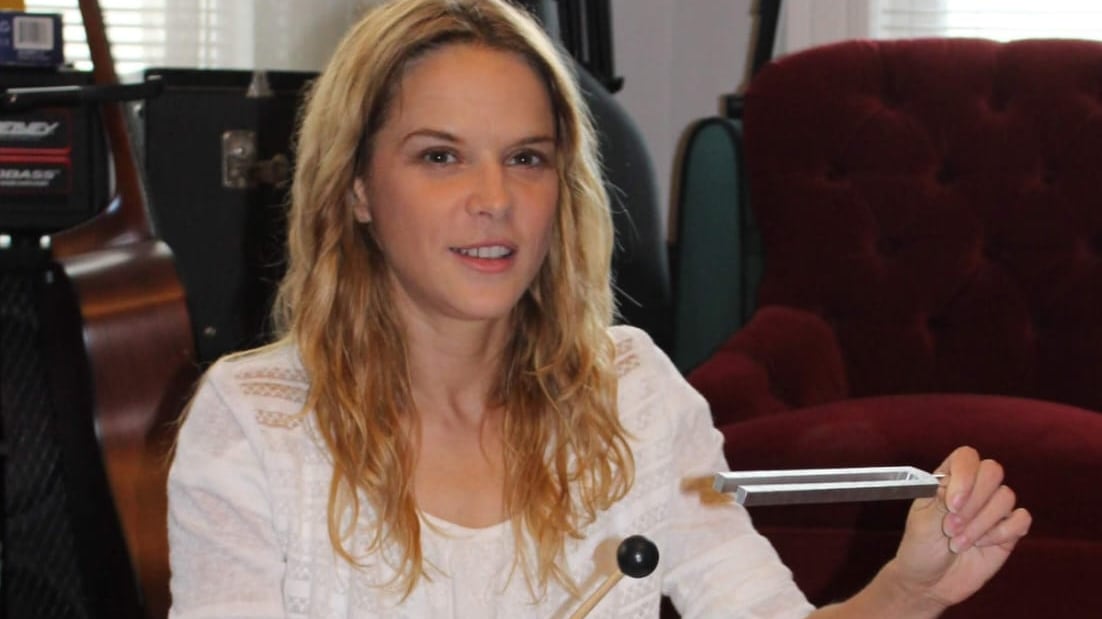A cottage industry has sprouted in Oregon’s legal market for psilocybin mushrooms: private career schools pumping out hundreds of “facilitators,” who then guide paying customers through intense encounters with psychedelics.
The Oregon Health Authority has approved a whopping 25 of these programs, which charge thousands of dollars in tuition and give graduates a shot at a state license to guide trips.
Until recently, Shasta Winn has been running one of the schools while traveling the country in a van.
For years, Winn has believed that psychedelics have the power to transform. A former addiction counselor who worked in clinics and halfway houses, Winn, 42, ditched the medical vibe and embraced a brand of psychedelic mysticism. In 2011, she co-founded Saba Cooperative, a religious movement with no hierarchy that blends spirituality, sustainability and psychedelics. Last year, she launched Myco-Method, a career school for trip sitters in Oregon.
Winn’s program has a New Age tilt: At an Ashland mushroom center, students learn the science of shrooms and how to safely guide tripping customers, but also how to apply the work of Swiss psychologist Carl Jung and the tarot. In her view, Myco-Method is an arm of the religious movement and thus exempt from state rules that require oversight by two state agencies.
The state disagrees.
After a year of warnings first reported last year by WW, the Oregon Health Authority notified Winn on June 3 of its plans to deauthorize the program next month. If it does, the agency would remove Myco-Method from its list of approved training programs and, critically, its graduates wouldn’t be allowed to work in Oregon’s legal psilocybin industry.
If OHA follows through, it would mark the first time the agency has revoked approval of a psilocybin business. (So far, regulators have denied two licenses for planned mushroom centers, including one at a Northeast Portland ketamine clinic that is located too close to a school.)
Myco-Method has produced about 20 graduates so far, charging $7,500 for a mix of online material and in-person education. Winn says a few have become state-licensed facilitators.
But the program taught those students while operating in a regulatory limbo. Oregon requires training programs for psilocybin facilitators to obtain approval from two agencies. Winn gained sanction for her curriculum from the Oregon Health Authority in March 2023. But instead of seeking licensure from the state Higher Education Coordinating Commission, which oversees private career schools, she requested a religious exemption.
The agency declined to issue an exemption in September 2023. But Winn kept admitting students, setting the stage for this month’s formal notice and the impending showdown.
That Winn could send trip guides into the marketplace for a year while disputing the state’s rules raises questions about the quality control Oregon shroom customers can expect.
Winn argues that the state agencies are in the wrong, and has filed a lawsuit to settle questions around religious exemptions. That’s pending in the Oregon Court of Appeals. But Winn isn’t terribly worried about the crackdown. She believes the agencies can’t force the closure of Myco-Method, only its involvement in the legal psilocybin industry, which she claims many of her students aren’t all that interested in.
“They can’t legally shut me down or stop me from teaching,” Winn says, “although there have been many implications and threats otherwise.”
One of the recent graduates is Robert Allen, a former teacher and hemp processor, who completed Myco-Method in December. The program took about four months and cost him about $7,000. (Winn says she gives discounts to many students. That’s common in the legal psilocybin industry, which is grappling with exorbitant costs and trying to diversify.)
Allen spoke highly of Winn and said Myco-Method emphasized the care of psilocybin clients, who enter profound and vulnerable states of consciousness. He said the program was a mix of hard science and spiritual elements “that can float into the hippie realm a little bit,” like the use of Jungian personality archetypes to suss out customers’ needs. A recent retreat for students at an Airbnb in Medford included “ecstatic dance”—unguided movement that, ideally, puts one in a trance.
Asked whether he thought of Myco-Method as religious, Allen said psychedelics advocates can legitimately position themselves as such to protect their practices.
But the program doesn’t involve worshiping any deities, he said. “Maybe the mushrooms. We’re not, like, praising Jah,” Allen added. He now works as a psilocybin trip facilitator at an Ashland clinic. State officials says they will not revoke his license, or that of any other Myco-Method graduate who has already obtained one.
Winn has a master’s degree in psychology and spent her early career on the East Coast, where she counseled people with mental health needs and addictions. As a counselor, she came to believe that the “clinical ways of doing things” could stabilize patients, but couldn’t offer them the profound change they needed to find happiness. Clinical research has long found that psychedelics like LSD and psilocybin can benefit people struggling with addictions, depression and trauma.
“I’m really more of the mystically, spiritually inclined,” Winn said in an interview.
Winn began working with psychedelics and headed to Jamaica and Mexico to work as a trip sitter. At one point, she embarked on a “hermitage,” using shrooms in an isolated cabin for 40 days. She has a penchant for convening people. In 2011, Winn launched Saba Cooperative, a faith-based nonprofit that promotes spiritual growth and the spread of sustainable communities—among them, an artists’ retreat shaped like a fat toadstool near Mount Hood.
Winn says she’s lived a “nomadic” lifestyle and floated west to Oregon in 2020, when voters approved Measure 109. She named Myco-Method for mycelia, the underground roots connecting mushrooms, which commonly take on symbolic meaning in psychedelic culture. Graduates like Allen who are interested in legal work tend to guide their clients at Satya Therapeutics, a mushroom center in Ashland co-founded by another Myco-Method alum, Andreas Met.
Winn says Myco-Method is a branch of Saba Cooperative, a religious organization, and therefore exempt from the state’s extensive licensing and approval requirements for training programs. That argument doesn’t have a precedent in the legal psilocybin industry.
“There is nothing in Measure 109 law/rules about religious exemptions,” Leslie Carlson, a spokeswoman for the psilocybin advocacy group Healing Advocacy Fund, which backed Measure 109, said in an email.
Endi Hartigan, a spokeswpman for the Higher Education Coordinating Commission, said the agency has the power to decide whether to grant religious exemptions. In the fall, the commission informed Winn in a letter that Myco-Method was effectively a “secular” educational program and denied it an exemption.
Winn hopes the state appeals court will decide the matter before July. Separately, she has filed another lawsuit challenging the state’s process of writing psilocybin regulations—which created the first regulated shroom industry in the world—and alleging she was denied due process. Winn doesn’t have a lawyer and says Chat GPT has been “pretty helpful” as she prepares legal documents.
She isn’t admitting new students at the moment.

